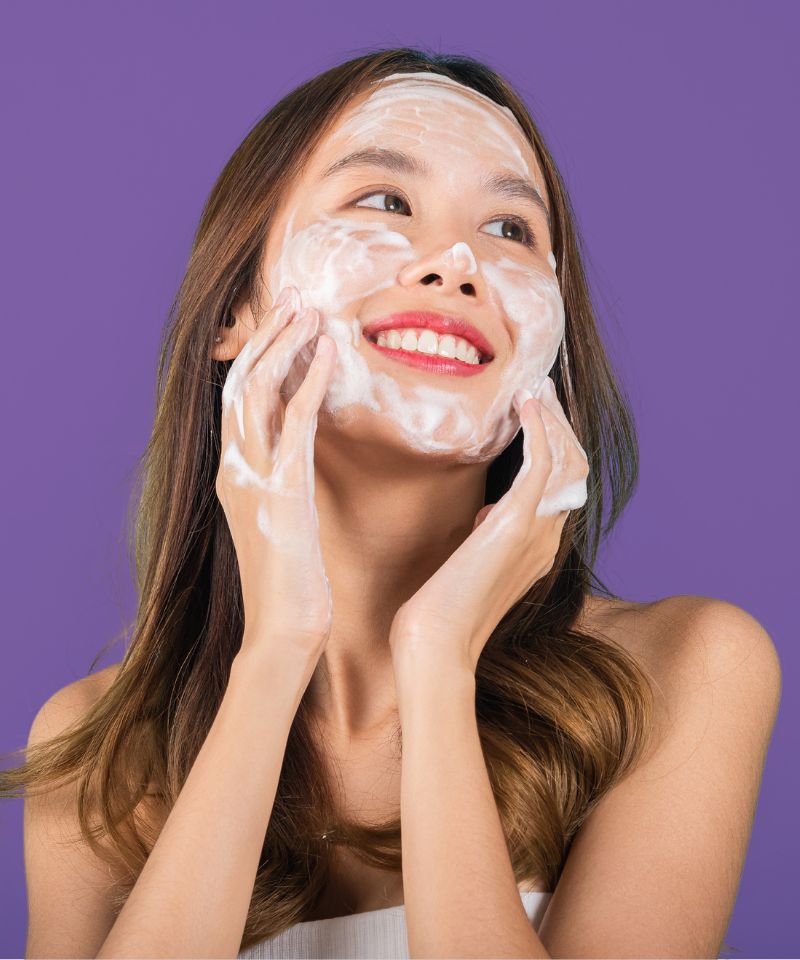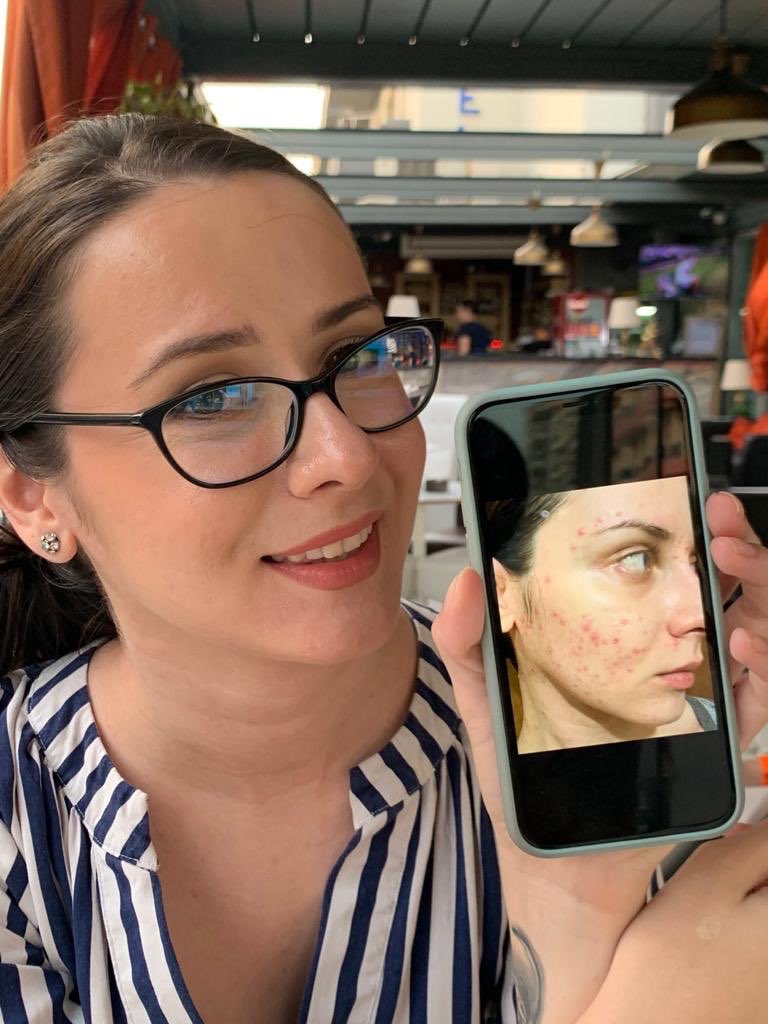As a teenager, you might not have the money to see a skin specialist, so you are often left to scrape information from the internet or trust your friends for skincare recommendations.
However, what you need to know here is that even though you and your friends may be going through puberty together, chances are your skin is different than theirs.
This also means that what may work for your friends might not be the best solution for your skin and individual concerns.
However, whatever skin concerns you may have as a teenager, there are a few simple things you can do to keep your skin healthy and acne-free.
Below, I will share my 10 best skincare tips for young teens that will help you achieve clear and healthy skin long-term.
TLDR:
- Determine Your Skin Type
- Create a Skin Care Routine
- Don’t Use Scrubs
- Don’t Apply Heavy Makeup
- Don’t Pop Your Pimples
- Invest In a Good Skincare Regimen
- Hydrate Your Skin
- Use Anti-Acne Products Carefully
- Don’t DIY Your Skincare
- Be Patient With Your Skin

#1: Determine Your Skin Type
Knowing your skin type and the concerns that often arise with it is crucial before purchasing skincare products.
Here’s how to determine your skin type and make smart investments to effectively address any skin concern you may experience:
Dry skin
Dry skin often feels rough and itchy and can sometimes look dull.
It has very small, almost invisible pores, and even after waking up in the morning, the skin feels tight and uncomfortable.
Dry skin needs extra moisturization to stay smooth and hydrated.
If you have determined that you have dry skin, avoid washing it with soap and use a gentle cleanser instead.
Additionally, make sure to moisturize at least twice a day with a rich moisturizer containing barrier-strengthening ingredients such as niacinamide and ceramides.
Combination skin
Combination skin usually means that certain areas of your face become a little more oily than others.
For example, you may notice oiliness in areas such as the chin, nose, and forehead, which is also known as the T-zone, while your cheeks may be drier.
In this case, you still need to make sure that you are providing an adequate amount of moisture to the dry areas while not making your T-zone too greasy.
You can still use a gentle cleanser and a lightweight moisturizer rather than a rich one.
Also, make sure to apply an extra amount of moisturizer on the cheeks while using just a tiny bit on the oily parts.
Oily skin
As the name suggests, oily skin looks shiny and is the easiest to determine
It is also often associated with large pores, blackheads, and acne.
During teenage years, hormone levels are always fluctuating, which can make oily skin more prominent in teens.
But, this doesn’t mean that you can’t keep it under control.
If you have oily and acne-prone skin, make sure to use a good cleanser that isn’t rich in super-moisturizing ingredients and is also not harsh enough to overdry your skin.
Additionally, exfoliation can be a fantastic way to keep blackheads and pimples under control, while a lightweight moisturizer will hydrate your skin and keep oil production in check.
#2: Create a Skincare Routine

Getting into the habit of a daily skincare routine is essential for healthy and clear skin.
Additionally, having a good skin care regimen in your teens can save you a lot of money down the line, as you will likely not need as many expensive skin-repairing treatments.
Here’s the best skincare routine for teens:
Cleanser
Using a suitable cleanser is essential in any teen’s skincare routine because it serves as the foundation for a healthy complexion.
A cleanser gently removes impurities, excess oil, and dirt from the skin’s surface, preventing clogged pores that often lead to acne outbreaks.
This is especially important for teens whose skin is already challenged by hormonal changes and is more prone to acne.
It’s important to choose a cleanser that suits your specific skin type to ensure that the skin is cleansed effectively without causing dryness or increased oil production.
My cleanser recommendations:
Exfoliator
Exfoliation is a key step in a teen’s skincare regimen, particularly for those who are prone to acne.
This process helps slough off dead skin cells and prevent this form of cellular debris from becoming stuck inside the pores and clogging them, which will lead to pimples.
When choosing an exfoliator, opt for a product that contains a low percentage of salicylic or mandelic acid, as these ingredients are gentle and effective for treating acne-prone skin.
Be sure to use an exfoliator no more than twice a week, as over-exfoliation can damage the skin barrier and result in irritation, which can lead to exacerbated acne.
My exfoliation recommendations:
Moisturizer
Applying a moisturizer is a vital part of any teen’s skincare regimen, necessary to maintain the skin’s natural hydration and barrier function.
A good moisturizer can help balance oil levels on the skin, keeping it soft and supple without contributing to acne, and can also prevent dryness that may lead to premature lines and wrinkles.
When selecting a moisturizer, choose one that’s formulated for your skin type — lightweight and non-comedogenic for oily and acne-prone skin and richer for dry and sensitive skin.
My moisturizer for teens products recommendations:
Sunscreen
The majority of sun damage happens in our childhood and teenage years, so it’s crucial for teens to incorporate sunscreen into their daily skincare routine.
Sunscreen protects the skin from harmful UV rays that can lead to sunburn, cellular damage, premature aging, hyperpigmentation, uneven skin tone, and even skin cancer later in life.
For acne-prone skin, choose a sunscreen that is oil-free and non-comedogenic to avoid exacerbating breakout issues.
On the other hand, dry skin may benefit from a sunscreen containing moisturizing ingredients to prevent discomfort related to dryness.
My best sunscreen recommendations & advice:
#3: Don’t Use Scrubs
Scrubs are popular products that remove accumulated dead skin cells from the surface of the skin, revealing a smoother and brighter complexion.
However, scrubs often contain sharp shards of plastic, apricot, or nut shells that can create micro-tearings in the skin.
These micro-wounds can lead to early degradation of collagen, which results in sagging skin and symptoms such as enlarged pores, premature lines, and wrinkles due to the skin being dragged down by gravity and not having enough collagen to support its ability to bounce back.
On the other hand, scrubs can also irritate the skin and cause long-term inflammation.
This triggers inflammation-responsive cells, such as melanocytes, into overdrive, leading to the formation of dark spots, patches, and uneven skin tone.
#4: Don’t Apply Heavy Makeup

Heavy makeup application, particularly at a young age, can have adverse effects on the skin, as teenage skin is often more sensitive and prone to damage from harsh products.
First of all, heavy foundations, concealers, and even powders often have an occlusive nature, which can trap oils, impurities, and dead skin cells, leading to acne breakouts by clogging pores and creating a perfect environment for bacterial growth.
This can not only lead to temporary inflammation and acne of various severities but can also permanently damage the skin, as acne is known to leave scars, marks, and even wrinkles in the long run.
Additionally, ingredients found in many makeup products, such as fragrance and fragrant components, can disrupt the natural balance of the skin, triggering irritation and allergies or even causing permanent conditions like eczema or dermatitis to flare up.
Young skin, still developing its natural defenses, is especially susceptible to chemical sensitivities that may not only cause immediate discomfort but also long-term sensitization.
Furthermore, continual use of heavy makeup can accelerate premature skin aging due to the potential for increased oxidative stress and hindrance of the skin’s ability to repair itself, emphasizing the importance of adopting gentle and skin-type appropriate makeup habits early on.
Therefore, while there is nothing wrong with applying a little bit of makeup to enhance and accentuate certain parts of your face, try to keep it light by using a minimal number of products, and always make sure to properly cleanse your skin at the end of each day.
#5: Don’t Pop Your Pimples
Popping pimples can be tempting, but it’s a practice that can do more harm than good.
When you pop a pimple, in order for the pus to come out, the skin needs to break, which creates a wound that’s vulnerable to becoming infected by external pathogens and inflammation.
Additionally, this disruption not only makes the area more susceptible to a temporary infection but can also slow down the healing process compared to the time it would take for the original pimple to resolve on its own.
Furthermore, the force used to expel the pus and debris can damage the surrounding tissue, often leading to a loss of tissue and scarring, which might not have occurred if the pimple had been left to heal naturally.
Therefore, instead of popping an inflamed pimple, try using a pimple patch or spot treatment to reduce the inflammation and speed up the healing process.
Regularly cleansing your skin and using acne-fighting products can also help prevent pimples from forming in the first place or encourage them to heal faster when they do form.
#6: Invest In a Good Skincare Regimen
As a teenager, it is understandable that you can’t afford to purchase expensive skin care products because chances are you are financially dependent on someone else.
However, by investing in a good skin care regimen (click to see how to create a budget-friendly and simple skincare routine), I certainly don’t mean super-expensive and luxury products.
Brands like Bioderma, CeraVe, or some Korean skincare brands like COSRX, Purito, and iUnik offer a wide variety of affordable but excellent skincare products that help you maintain clear and healthy skin without drying out your wallet.
#7: Hydrate Your Skin
Introducing a hydrating toner or a serum into your skincare regimen is not necessary; however, it’s a fantastic way to keep your skin hydrated, plump, and nourished.
Both toners and serums can provide the skin with an extra layer of hydration, helping it retain moisture and maintain its barrier function.
This is especially beneficial for teens with oily or acne-prone skin as they may be using harsher products to combat their acne, which can strip the skin of its natural moisture and lead to flaking, peeling, as well as more oiliness as the skin overcompensates for the lack of moisture.
On the other hand, teens with dry skin can benefit from a hydrating toner or serum that will help replenish the skin’s moisture and prevent dryness, which can lead to discomfort and irritation.
Overall incorporating toners or serums with ingredients such as hyaluronic acid can be good for teenage skin as it can help to balance the skin’s moisture levels and improve its overall appearance.
In addition to using toners and serums, make sure to also drink plenty of water throughout the day to keep your skin hydrated from within.
Proper hydration is essential for maintaining healthy and youthful-looking skin.
#8: Use Anti-Acne Products Carefully
When you’re a teenager, and you don’t know how the skin functions and how certain products you apply to it might affect it in the long run, it can be tempting to use strong anti-acne products in hopes of quickly getting rid of breakouts.
However, using these products too frequently or without proper guidance can damage the skin, and this damage will eventually show up with visible symptoms.
For example, products containing salicylic acid or benzoyl peroxide are effective in reducing acne; however, using them incorrectly or overusing them can lead to excessive dryness and inflammation that can compromise the skin barrier’s function.
When the skin barrier is compromised or harmed, it will have a harder time protecting itself from external factors such as bacteria, environmental stressors, and UV radiation, and internal factors such as inflammation.
While it may seem insignificant to worry about invisible damage when you’re currently battling acne, remember that these minor issues can not only set the course for skin damage that will become prominent in a few year’s time but can also prolong the healing process of acne.
This delay can increase the risk of developing acne scars, as the longer a pimple and its surrounding area remain inflamed, the higher the likelihood of scarring.
Additionally, when using anti-acne products, be sure to not only use them as directed but also listen to your skin and adapt your routine to its needs.
If a new anti-acne product is causing excessive dryness, irritation, stinging, or burning, this is usually a sign to reduce the frequency of use or to try a different product altogether.
On the other hand, if containing active ingredients such as exfoliating acids or retinoids is causing you to break out, this might mean you are going through a purge, which is a phase where the skin gets worse before it gets better.
In this case, you shouldn’t abandon ship altogether, but you should understand how these products work and why your skin reacts the way it does to provide it with adequate nourishment and care and help it heal.
This way, you can ensure that your anti-acne products work with your skin to improve it rather than against it to damage it.
Therefore, before starting a new product, it’s important to take some time to understand its ingredients better.
This will help you use the product as directed while also being attentive to your skin’s reactions and adapting your routine accordingly to achieve the best results with minimal side effects.
#9: Don’t DIY Your Skincare
The internet is full of DIY skincare recipes and hacks that claim to be the secret to flawless skin.
However, not everything on the internet is accurate or safe, and this applies to DIY skincare as well.
Some ingredients, such as lemon juice, baking soda, toothpaste, and even VapoRub, are often touted as natural or quick remedies for acne.
However, they can irritate the skin in the short term and lead to damage and complications in the long run.
For example, mixing lemon juice, which has a pH of 3, and baking soda, which has a pH of 9, and applying it to the skin, whose healthy pH level falls between 4.5 and 6.2, can dissolve its acid mantle, a protective layer that keeps the skin healthy and functioning.
This will give way to harmful bacteria and pathogens to enter and colonize the skin, leading to inflammation, infections, and even permanent skin conditions such as eczema and dermatitis.
It’s important to note that not all natural ingredients are safe for the skin, and not everything labeled as “organic” is necessarily beneficial.
Therefore, always try to invest in skincare products that have been tested and backed by scientific research before turning to DIY, which can, ironically, end up costing you more in the long run if it damages your skin.
#10: Be Patient With Your Skin

Patience with your skin is a virtue, especially during the teenage years when hormones can make your complexion unpredictable.
It’s crucial to understand that skin, much like the rest of the body, is undergoing constant changes and needs time to adapt to new products and routines.
Jumping rapidly from one treatment to another in search of immediate results can actually exacerbate skin issues, causing more harm than good.
On the other hand, cultivating the habit of patience allows for a mindful approach to skincare, giving each product ample time to work and the skin’s natural healing processes to take effect, which ultimately leads to healthier skin in the long term.
Therefore, instead of spending hours looking for the next holy grail, invest some time in learning how your skin functions, what are the essential components that keep it healthy, and how to achieve balance and harmony without putting too much focus on elaborate routines or quick fixes.
Over 85% of teenagers struggle with acne…

If you’re a teen with acne, know you’re not alone in this.
It’s a battle many of us face every day, looking in the mirror and wishing for clearer skin.
That’s exactly why I created my course ‘The Acne Solution‘.
It’s your personal guide, offering simple, effective strategies to conquer acne once and for all.
You’ll learn how to care for your skin in ways that actually work, cutting through the noise and confusion.

My name is Simone and I am a certified skin specialist. I created this website to teach my readers how to take great care of their skin and I also like to occasionally share my honest opinions on skincare products I’ve tried. You can learn more about me here.
